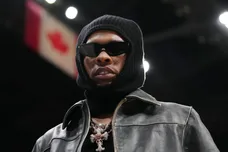Derek Chauvin was found guilty of second-degree unintentional murder, third-degree murder, and second-degree manslaughter. The verdict was read on April 20th by Judge Peter Cahill in a Hennepin County court following the deliberation of the 12-member jury. Afterward, many in the hip-hop community and beyond rejoiced, expressing optimism that perhaps a change was on the horizon.
With the sentencing date weeks away, CNN has reported that Judge Cahill has ruled that there were four aggravating factors in the killing of George Floyd and as such, a longer sentence can be given. This decision arrives after Prosecutors sought a stricter sentence for each of Chauvin's charges, with Minnesota sentencing guidelines generally recommending twelve years for the murder charges and four years for the manslaughter.
After Prosecutors named five aggravating factors that justified a stricter sentence, Judge Cahill agreed that Chauvin "abused a position of trust and authority," "treated Floyd with particular cruelty," committed the offense in the presence of children, and committed the crime as a group. It should be noted that Cahill rejected the fifth factor, which suggested that "Floyd was particularly vulnerable."
Minnesota Department of Corrections via Getty Images
These four factors have opened the door for the Judge to issue a harsher sentence, with a potential 40 years for the second-degree murder charge, 25 years for the third-degree murder charge, and up to 10 for manslaughter. Following the update, Floyd family attorney Ben Crump issued a statement in response.
"We applaud Judge Cahill for ruling that four of five aggravating factors were proven beyond a shadow of a doubt, which could significantly and appropriately lengthen his sentence," says Crump. "Clearly, Chauvin abused a position of trust, treated George Floyd with particular cruelty, and committed the crime in the presence of children and with the active participation of at least three other people -- the other officers still to be tried. The application of justice in this case offers hope that we will see real change in the relationship between police and people of color by holding officers properly accountable for egregious behavior and for failing to honor the sanctity of all lives.”
[via]









